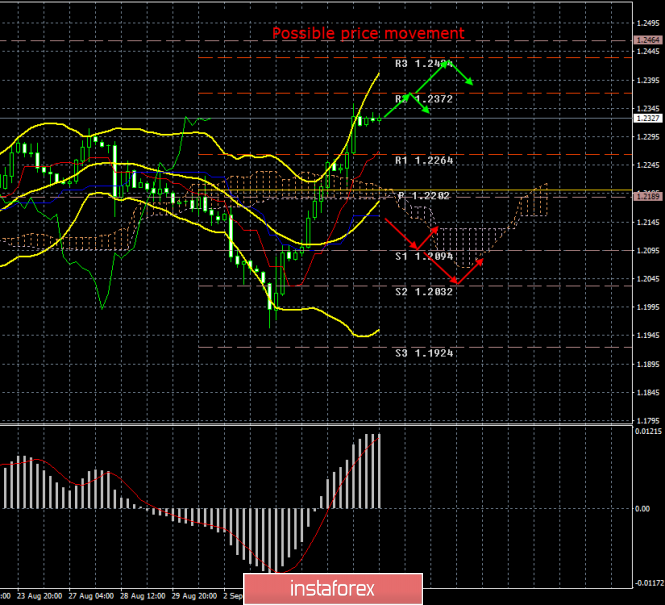4-hour timeframe

Amplitude of the last 5 days (high-low): 86p - 139p - 147p - 176p - 144p.
Average volatility over the past 5 days: 138p (high).
Over the past weeks or even months, we have written almost every day that there is nothing surprising in another fall in the pound. The country was rushing at full speed to meet the hard Brexit, beginning on July 23, when the name of the new prime minister who replaced Theresa May was officially announced. However, a month before July 23, it was clear that it was Boris Johnson who would win the election, with such ease he went through every round of elections. Since Johnson from the very beginning, even before the election, actively supported Brexit at all costs, he cannot be blamed for hypocrisy or lies. From the very beginning, Boris Johnson stated that the country should leave the EU on time on October 31, and it does not matter whether it was with or without a "deal". So what did the Parliament want from its prime minister? In order for him to change his entire policy within a month on the most important and pressing issue for the whole of Great Britain in the last three years? Indeed, one might say that Boris Johnson "went too far", trying to force the hard Brexit through the Parliament. He sent MPs on vacation, threatened a re-election, threatened to expel those deputies who would not support his initiative from the party and eventually lost. Johnson clearly did not expect that such a number of deputies (obviously more than half of the Parliament) would not only express their dissatisfaction with his decisions, but would also declare an almost open war on the prime minister. Now Brexit has been postponed to January 31, and there will be no re-election. Boris Johnson can only follow in Theresa May's footsteps and try to negotiate an agreement with the EU leaders, since Parliament will not approve of the hard Brexit, and Johnson will not be able to send Parliament on vacation every three months.
As for the British Parliament itself, it can be said that it also outplayed itself. What did MPs expect from Johnson? Why did the Conservatives choose a leader at all, even if not everyone within the party supported his initiatives? The first session of Parliament after the holidays ended with a free and quiet exit of about 20 members of the Conservative party from its composition. Even Boris Johnson's own brother, who holds a post in Parliament and is the minister for universities and science, has refused his position and is about to resign. If the majority of deputies believes that Brexit should be as soft as possible, with a "deal", why choose Johnson, who never supported such an option. All these questions will remain unanswered, the UK will remain in the European Union at least until February 2020, the pound will remain in limbo until that time.
The technical picture of the pound/dollar pair is encouraging. There is a strong signal to buy the "Golden cross", so now the trend is upward. However, today we can expect a downward correction, as the pound grew non-stop for three days. Today, a rather voluminous package of macroeconomic information in the US will be released. If it is upbeat, then the strengthening of the dollar is very likely.
In addition to the technical picture, fundamental data and the time of their release should also be taken into account.
Explanation of the illustration:
Ichimoku indicator:
Tenkan-sen is the red line.
Kijun-sen is the blue line.
Senkou Span A - light brown dotted line.
Senkou Span B - light purple dashed line.
Chikou Span - green line.
Bollinger Bands Indicator:
3 yellow lines.
MACD indicator:
Red line and bar graph with white bars in the indicator window.
The material has been provided by InstaForex Company - www.instaforex.com